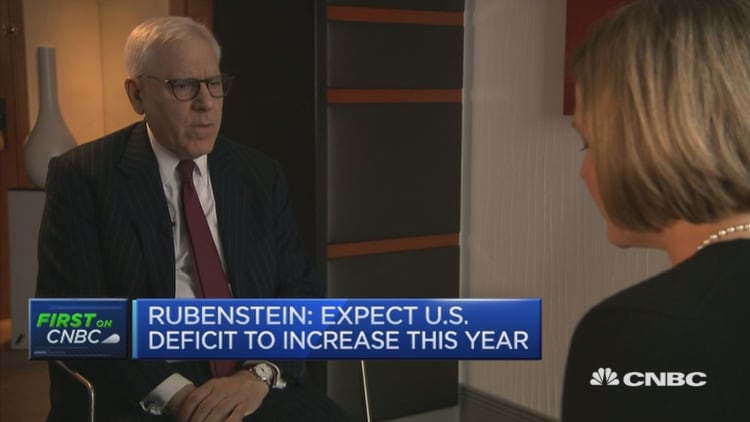
President Donald Trump is very serious about pushing through the tax cuts promised in his campaign but getting them through Congress will not be easy, according to The Carlyle Group's David Rubenstein.
"He certainly intends to follow through but getting things through our Congress is not that easy. But it's clear from the President's speech last night and what he's said before that that he's very serious about the promises he made during his campaign…I think he'll push," the private equity giant's co-founder told CNBC in Berlin on Wednesday.
Given the lengthy Congressional process, Rubenstein estimates we are unlikely to see a definitive outcome on the tax cut question this year.
"The President will no doubt have some principles that he'll set forth soon and no doubt there'll be corporate tax cuts in those and repatriating money from offshore. I think that'll probably happen in the next week or two or three… but I think it'll take about a year before it gets done," said Rubenstein, reminding viewers that a similar length of time was needed for former Presidents Ronald Reagan and George W. Bush to enact their changes to tax policy.
While much media commentary has focused on exactly how the current administration will square Trump's priorities of cutting taxes and boosting fiscal spend, Rubenstein sounded a sanguine note on the prospect of yet another rise in the debt ceiling, a restriction which he clarified was not a constitutional requirement.
"Every President struggles to get the debt ceiling raised and Congress is never in favour of it but the debt ceiling always does get raised and it'll get raised eventually," he said, adding that once that happened, he would expect borrowing to increase given the relatively supportive environment provided by current interest rates and the existing ratio of debt to gross domestic product (GDP).
"I would not be surprised if the deficit went up a fair bit this year in part because of tax cuts," the private equity titan opined.
"I don't know that it's a negative. I think that our economy if it grows at 2 percent or 2.5 percent a year can probably tolerate a little bit more debt than we currently have or a higher deficit. But clearly in the outer years it would be expected that more tax revenue would come in from higher growth and that's a large premise of what the president's probably trying to do," he added, highlighting what to watch as a measure of the policies' success.

Rubenstein pointed to the business cycle as the biggest risk currently facing the global economy, noting that there tends to be a recession every seven years and that we are currently at the 8 years and counting mark. He said he had moved out his estimate of when the business cycle would turn to 2018 and agreed with the proposition that some additional deficit spending at that time could indeed be helpful, adding, "and probably some reducing of interest rates at that time could be helpful as well."
Turning to consider Europe, Rubenstein suggested that the continent's leaders could learn something from the President's vow to slash regulation, as exemplified by his pledge to reform the financial services legislation known as the Dodd-Frank Act.
"I think most people in Europe would say the European Union is a fairly bureaucratic organization and therefore reducing some bureaucracy and reducing some regulation would probably be helpful to the European economy," he suggested.
Taking a look at the political conversation currently dominating European politics, Rubenstein said he did not expect the far right's Marine Le Pen to win the upcoming French Presidential vote – but offered a qualification on his ability to pre-judge electoral outcomes.
"It's unlikely based on what I know today that Le Pen will win… I didn't really think that President Trump would win either, therefore I was wrong there, I could be wrong in France. If France were to vote for Le Pen, I do think it could shake up Europe quite a bit."



